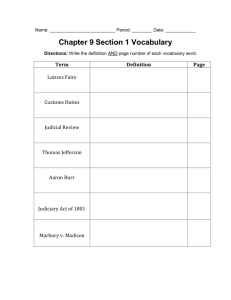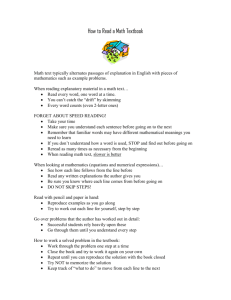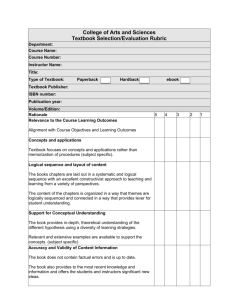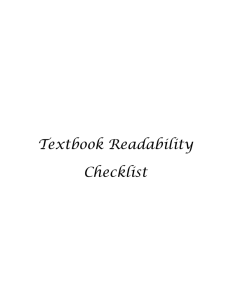Class Syllabus - Gregg Cantrell
advertisement
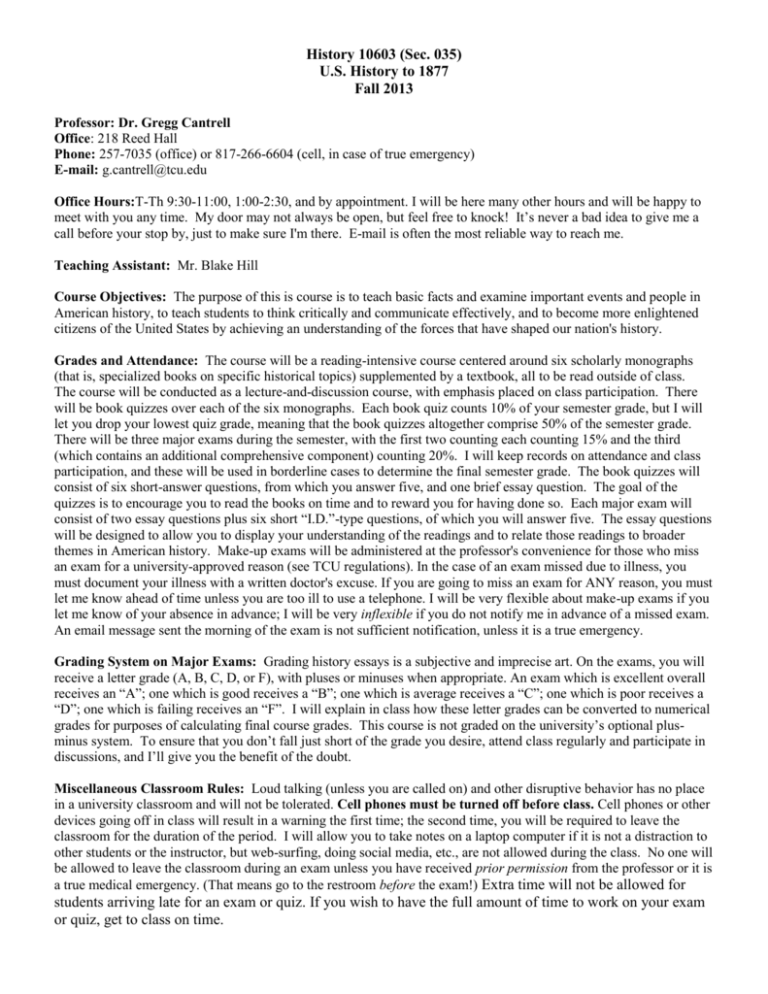
History 10603 (Sec. 035) U.S. History to 1877 Fall 2013 Professor: Dr. Gregg Cantrell Office: 218 Reed Hall Phone: 257-7035 (office) or 817-266-6604 (cell, in case of true emergency) E-mail: g.cantrell@tcu.edu Office Hours:T-Th 9:30-11:00, 1:00-2:30, and by appointment. I will be here many other hours and will be happy to meet with you any time. My door may not always be open, but feel free to knock! It’s never a bad idea to give me a call before your stop by, just to make sure I'm there. E-mail is often the most reliable way to reach me. Teaching Assistant: Mr. Blake Hill Course Objectives: The purpose of this is course is to teach basic facts and examine important events and people in American history, to teach students to think critically and communicate effectively, and to become more enlightened citizens of the United States by achieving an understanding of the forces that have shaped our nation's history. Grades and Attendance: The course will be a reading-intensive course centered around six scholarly monographs (that is, specialized books on specific historical topics) supplemented by a textbook, all to be read outside of class. The course will be conducted as a lecture-and-discussion course, with emphasis placed on class participation. There will be book quizzes over each of the six monographs. Each book quiz counts 10% of your semester grade, but I will let you drop your lowest quiz grade, meaning that the book quizzes altogether comprise 50% of the semester grade. There will be three major exams during the semester, with the first two counting each counting 15% and the third (which contains an additional comprehensive component) counting 20%. I will keep records on attendance and class participation, and these will be used in borderline cases to determine the final semester grade. The book quizzes will consist of six short-answer questions, from which you answer five, and one brief essay question. The goal of the quizzes is to encourage you to read the books on time and to reward you for having done so. Each major exam will consist of two essay questions plus six short “I.D.”-type questions, of which you will answer five. The essay questions will be designed to allow you to display your understanding of the readings and to relate those readings to broader themes in American history. Make-up exams will be administered at the professor's convenience for those who miss an exam for a university-approved reason (see TCU regulations). In the case of an exam missed due to illness, you must document your illness with a written doctor's excuse. If you are going to miss an exam for ANY reason, you must let me know ahead of time unless you are too ill to use a telephone. I will be very flexible about make-up exams if you let me know of your absence in advance; I will be very inflexible if you do not notify me in advance of a missed exam. An email message sent the morning of the exam is not sufficient notification, unless it is a true emergency. Grading System on Major Exams: Grading history essays is a subjective and imprecise art. On the exams, you will receive a letter grade (A, B, C, D, or F), with pluses or minuses when appropriate. An exam which is excellent overall receives an “A”; one which is good receives a “B”; one which is average receives a “C”; one which is poor receives a “D”; one which is failing receives an “F”. I will explain in class how these letter grades can be converted to numerical grades for purposes of calculating final course grades. This course is not graded on the university’s optional plusminus system. To ensure that you don’t fall just short of the grade you desire, attend class regularly and participate in discussions, and I’ll give you the benefit of the doubt. Miscellaneous Classroom Rules: Loud talking (unless you are called on) and other disruptive behavior has no place in a university classroom and will not be tolerated. Cell phones must be turned off before class. Cell phones or other devices going off in class will result in a warning the first time; the second time, you will be required to leave the classroom for the duration of the period. I will allow you to take notes on a laptop computer if it is not a distraction to other students or the instructor, but web-surfing, doing social media, etc., are not allowed during the class. No one will be allowed to leave the classroom during an exam unless you have received prior permission from the professor or it is a true medical emergency. (That means go to the restroom before the exam!) Extra time will not be allowed for students arriving late for an exam or quiz. If you wish to have the full amount of time to work on your exam or quiz, get to class on time. Books: The following books are required reading: Textbook: James Oakes, et al, Of the People: A History of the United States, Concise, Volume I: To 1877 (brief ed.), Vol. I, to 1877. Monographs: Edmund Morgan, The Puritan Dilemma: The Story of John Winthrop T. H. Breen and Stephen Innes, Myne Owne Ground: Race and Freedom on Virginia’s Eastern Shore Robert A. Gross, The Minutemen and their World Laurel Thatcher Ulrich, A Midwife's Tale: The Life of Martha Ballard, Based on Her Diary Melton A. McLaurin, Celia, A Slave Nicholas Lemann, Redemption: The Last Battle of the Civil War TENTATIVE SCHEDULE OF CLASSES, TOPICS, EXAMS AND ASSIGNMENTS * Class Activities/Topics Reading Week 1 Aug. 20 Aug. 22 course intro. a “new” world “Academically Adrift” (in-class reading) start Myne Owne Ground;; textbook Ch. 1 Week 2 Aug. 27 Aug. 29 exploration the founding of Virginia continue Myne Owne Ground; textbook Ch. 2 continue Myne Owne Ground; textbook Ch. 3 Week 3 Sept. 3 Sept. 5 Myne Own Ground quiz; the origins of slavery Puritanism start The Puritan Dilemma; textbook Ch. 3 continue The Puritan Dilemma; textbook Ch. 4 Week 4 Sept. 10 Sept. 12 no class (TCU convocation) a New England Town continue The Puritan Dilemma; textbook Ch. 4 continue The Puritan Dilemma; textbook Ch. 4 Week 5 Sept. 17 Sept. 19 colonial society in the 1700s The Puritan Dilemma quiz; colonial society continue The Puritan Dilemma; textbook Ch. 5 textbook Ch. 5 Week 6 Sept. 24 Sept. 26 first major exam America and the British Empire start Minutemen; textbook Ch. 6 Week 7 Oct. 1 Oct.3 The American Revolution The American Revolution continue Minutemen; textbook Ch. 7 continue Minutemen; textbook Ch. 7 Week 8 Oct. 8 Oct. 10 Minutemen quiz; framing a government the transformation of American life start A Midwife’s Tale; textbook Ch. 8 continue A Midwife’s Tale; textbook Ch. 9 Week 9 Oct. 15 Oct. 17 religion and revival a nation of reformers continue A Midwife’s Tale; textbook Ch. 10 continue A Midwife’s Tale, textbook Ch. 11 Week 10 Oct. 22 Oct. 24 no class -- fall break A Midwife’s Tale quiz; true womanhood continue A Midwife’s Tale, textbook Ch. 11 textbook Ch. 12 Week 11 Oct. 29 Oct. 31 second major exam slavery revitalized; the proslavery argument start Celia; textbook Ch. 12 Week 12 Nov. 5 Nov. 7 the abolitionist crusade Free Soil; Manifest Destiny continue Celia; textbook Ch. 12 continue Celia; textbook Ch. 13 Week 13 Nov. 12 Nov. 14 the crisis of the 1850s Celia quiz; secession continue Celia; textbook Ch. 14 start Redemption; textbook Ch. 15 Week 14 Nov. 19 Nov. 21 the Civil War no class -- Thanksgiving continue Redemption; textbook Ch. 15 continue Redemption; textbook Ch. 16 Week 15 Nov. 26 Nov. 28 Reconstructing the nation America’s unfinished revolution; redemption continue Redemption; textbook Ch. 16 continue Redemption; textbook Ch. 16 Week 16 Dec. 3 Redemption quiz; course conclusion & review textbook Ch. 16 Tues, Dec. 10 Third/Final exam, 11:30-2:00 * Please note that this schedule is tentative; dates of exams or quizzes could change if we get ahead or behind. Any changes in the printed schedule will be announced at least a week (two class periods) in advance. It is your responsibility to know when quizzes and exams are being given. Friendly words of advice and warning: This class is all about the reading. It is a heavy reading load, but it’s manageable if you don’t put if off until the night before the quiz or exam. The first key to doing well is to read some every day. There are about 100 days in the semester, and you have about 1200 pages of reading in the six monographs; that’s about 12 pages a day. (The textbook is for review and reference; how much time you spend reading it is up to you.) Doing your reading on time will also enable you to participate in class discussions and understand the material better. You cannot do well on the quizzes and exams without having done your required reading. The second key to doing well is to come to class faithfully; we will discuss the books almost every class period, and the exams draw heavily from the lectures as well as the books. The third key to doing well in this class is to ask questions when you don't understand something. The only dumb question is the one you didn't ask! If the question can't be answered to your satisfaction in the class period, come see me in my office. I'll be happy to explain something that was unclear the first time around. And please don't hesitate to challenge something I've said in class; once or twice in my life I may have been wrong! ;-) Special Accommodation Request Procedure If you require accommodations for a disability, please contact the Coordinator for Students with Disabilities, Center for Academic Services, Sadler Hall 11, TCU Box 297710, 817-257-7486. Once you have met with me to deliver and discuss an official accommodations letter from TCU's Academic Services, I will be able to arrange for your modifications related to this course. If you have emergency medical information or need special arrangements in case the building must be evacuated, please discuss this with me as soon as possible.



